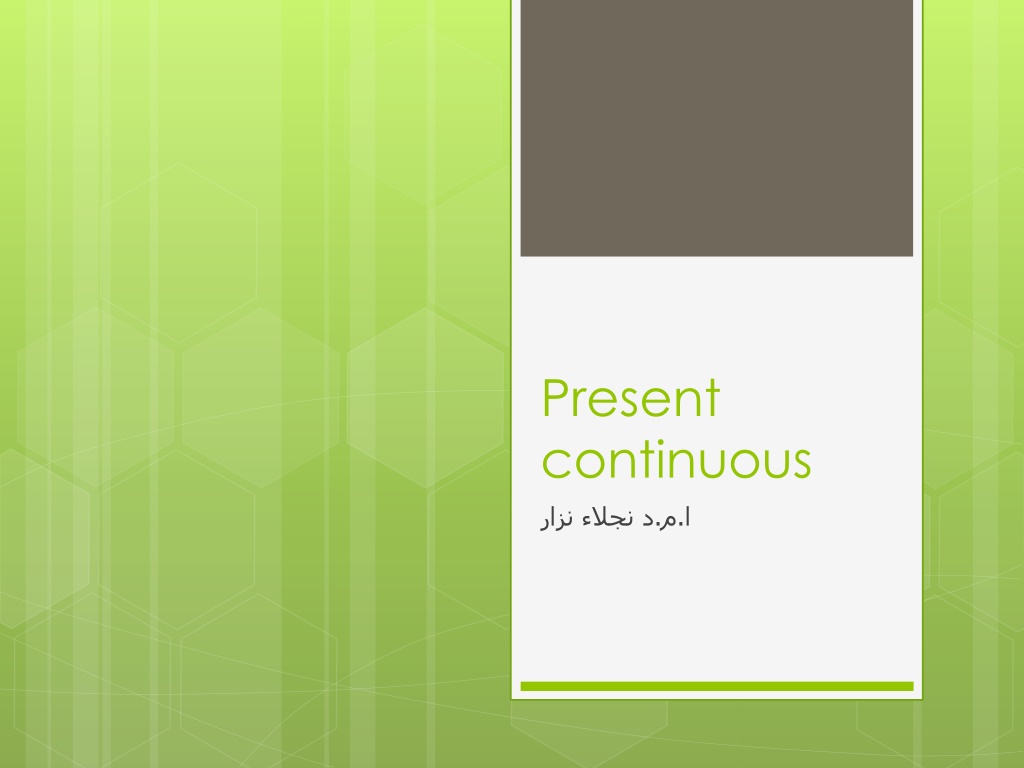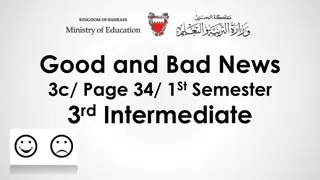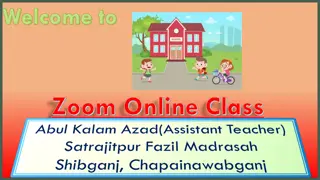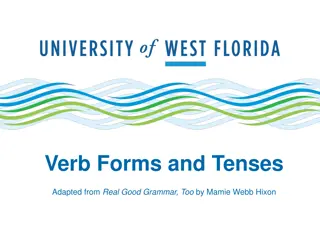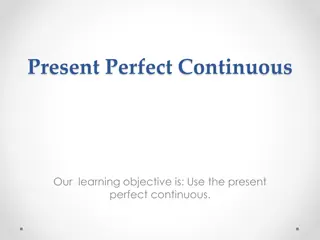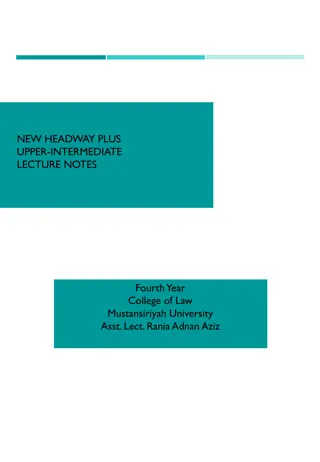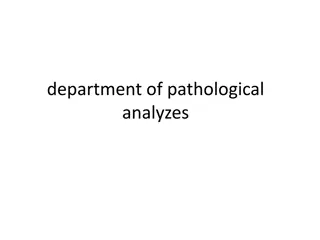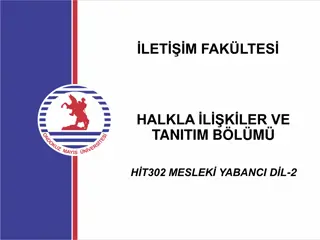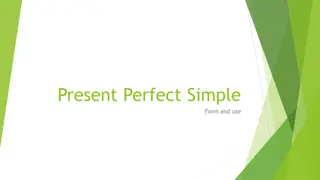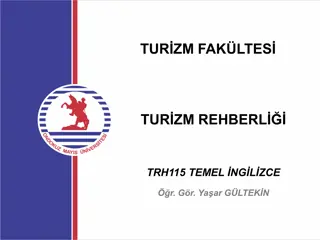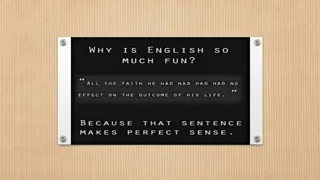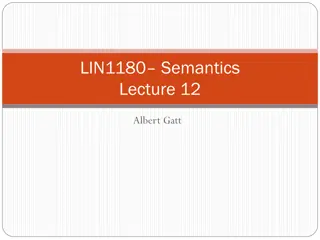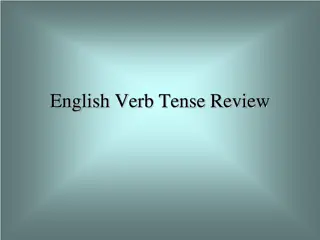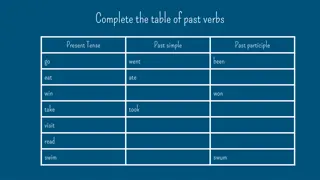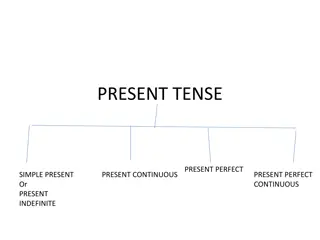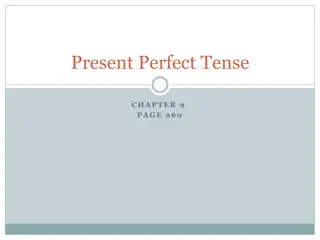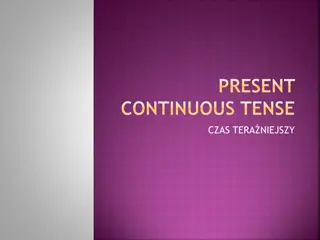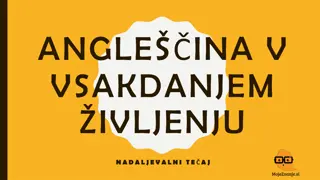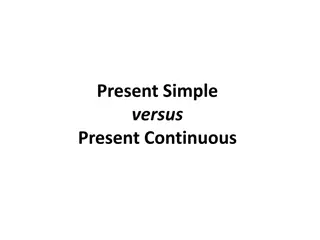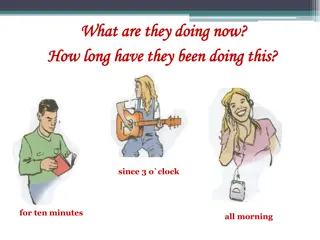Present Continuous Tense
The present continuous tense is used for actions happening now or still unfolding. It is also utilized for temporary actions. Learn how to form this tense with subject-verb-be combinations and -ing form. Examples include ongoing activities like sitting, reading, and talking, as well as future intentions. Explore the past continuous tense for describing unfinished actions in the past, interrupted events, and ongoing past actions.
Download Presentation

Please find below an Image/Link to download the presentation.
The content on the website is provided AS IS for your information and personal use only. It may not be sold, licensed, or shared on other websites without obtaining consent from the author.If you encounter any issues during the download, it is possible that the publisher has removed the file from their server.
You are allowed to download the files provided on this website for personal or commercial use, subject to the condition that they are used lawfully. All files are the property of their respective owners.
The content on the website is provided AS IS for your information and personal use only. It may not be sold, licensed, or shared on other websites without obtaining consent from the author.
E N D
Presentation Transcript
Present continuous . .
Present Continuous Tense Examples The present continuous tense is used for actions happening now or for an action that is unfinished. This tense is also used when the action is temporary. / . . . Now .
How to Form the Present Continuous Tense The present continuous tense is formed with the subject plus the present particle form (-ing) of the main verb and the present continuous tense of the verb to be: am, is, are. Example He is swimming now. Naser and Mohammad are playing football now.
Ali is sitting in the chair now. Rose is reading a book now She is crying now. He is talking to his friend. The baby is sleeping in his bed. Marc is making pizza now. They are eating lunch right now. Frances is talking on the phone at the moment.
Present continuous tense can also be used to show that something will or will not happen in the near future. Examples of this use include:
She is not going to the game tonight. He is meeting his friends after school. Are you visiting your cousin this weekend? I am not going to the meeting after work. Is John playing football today?
PAST CONTINUOUS The past continuous describes actions or events in a time before now, which began in the past and is still going on at the time of speaking. In other words, it expresses an unfinished or incomplete action in the past. S+ were\was + v (ing) (was( I, she , he , it ( were (they , you , we
to describe an unfinished action that was interrupted by another event or action, e.g. "I was having a beautiful dream when the alarm clock rang.
1. They were waiting for the bus when the accident happened. 2. Caroline was playing when she broke her leg. 3. When we arrived he was having a bath. 4. When the fire started I was watching television.
Future Continuous Tense subject + auxiliary verb WILL + auxiliary verb BE + main verb invariable invariable present participle will Be base + ing
subjectauxiliary verb auxiliary verb main verb + I will Be working at 10am. + You will Be lying on a beach tomorrow. - She will not Be using the car. - We will not Be having dinner at home. ? Will you Be playing football? ? Will they Be watching TV?
When we use the future continuous tense in speaking, we often contract the subject and will: I will I'll you will you'll he will she will it will he'll she'll it'll we will we'll they will they'll
For spoken negative sentences in the future continuous tense, we contract with won't, like this: I will not I won't you will not you won't he will not she will not it will not he won't she won't it won't we will not we won't they will not they won't
I will be playing tennis at 10am tomorrow. They won't be watching TV at 9pm tonight. What will you be doing at 10pm tonight? What will you be doing when I arrive? She will not be sleeping when you telephone her. We'll be having dinner when the film starts. Take your umbrella. It will be raining when you return.
Future actions in progress Guesses about the present or the future Polite questions about somebody's intention
Declarative Sentences Subject e.g. I/a dogetc. Auxiliary verb Auxiliary verb Verb + ing e.g.working/g oing/making + + + will Be
She'll be having a bath when I'm back home. (Use 1) Tomorrow at nine, I will be hosing off (=washing with a hose) my car. (Use 1) This time next week, I am going to be throwing a party. (Use 1) I'll be watching TV when my mother arrives. (Use 1) They will be getting home just about now. (Use 2)
Questions Auxiliary verb Subject Auxiliary verb Verb + ing + + + ? I/you/we etc. will Be dancing / taking
Is she going to be cooking when we knock at the door? (Use 1) Will Mark be playing football at 6 p.m.? (Use 1) Will you be using the screwdriver? (Use 3)
Negative Sentences Subject e.g. I/a dogetc. Auxiliary verb Auxiliary verb Verb + ing e.g.working/g oing/making + + + will not Be
We won't be having supper tomorrow before 8 o'clock. (Use 1) Iam not going to be learning English tomorrow at this time. (Use 1) John won't be sleeping now (= I think John isn't sleeping now) (Use 2)
